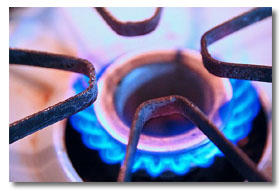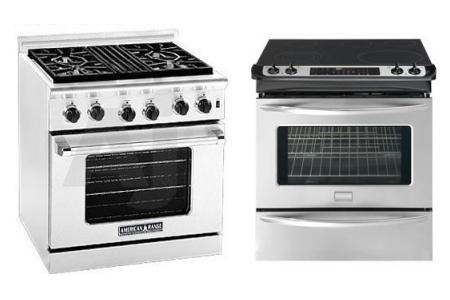Gas Vs. Electric Range: 5 Things to Think about and the Pro’s and Con’s
Categories: Brunswick County Home Building, Electric Range, Electrical, Gas Range, Jeff Satterwhite, NC Construction | Posted: July 28, 2012
 With the large ‘range’ of options available, it can be overwhelming to narrow the field to choosing between gas or electric, and furthermore, deciding on a model. Many people have strong opinions and swear by one or the other. In reality, they will both get the job done and each has its own strengths and weaknesses.
With the large ‘range’ of options available, it can be overwhelming to narrow the field to choosing between gas or electric, and furthermore, deciding on a model. Many people have strong opinions and swear by one or the other. In reality, they will both get the job done and each has its own strengths and weaknesses.
Before You Shop for your Gas or Electric Range
1. Measure Up!
Check the dimensions of the range you’re interested in to help ensure a proper fit. Look for installation instructions on each range for those dimensions.
2. Are you a Multi-task Cook?
For most people, a cooktop with four burners will work fine. If you love to cook, have a large family or entertain often, you may want the professional appearance and flexibility of five or more burners? Just a thought.
3. It’s Getting Hot in Here.
Think about finding a cooktop with a power burner to quickly bring foods to a boil. Or, try a simmer burner to prepare light sauces using low and even heat. If you use basic pots and pans, a dual-element burner is perfect for controlled simmering with small pans, and then you can use the outer ring for larger pans.
4. Cabinet Space?
Ranges can be freestanding, slide-in or drop-in. Freestanding is best if either side isn’t next to a cabinet, whereas a slide-in is best if it’s between two cabinets.
5. Top Chef or Heat and Eat?
Home chefs should look for high performance and precision features. Many prefer the performance of gas or the precision of induction. For the everyday cook, convenience and flexibility may be more important. Consider a smooth-top radiant cooktop for easy-to-clean functionality.

A Deeper Look
A major consideration for anyone purchasing a new kitchen range is cost. Overall, electric ranges are less expensive to manufacture making them less expensive to purchase. Cost will also be significantly less if your kitchen is pre-wired for an electric range. It can become costly if you have to have a gas line run into an existing property.
Electric Ranges
Pros:
- Less expensive to buy and install.
- Easier to clean burners and surfaces.
- Smooth-top electric ranges are more stable for pots and offer additional counter or storage space when not in use.
- Instantly turns on and off every time with the twist of a knob versus gas ranges that may sputter to catch a flame, emitting un-burned and potentially hazardous gas. No igniter or lighter necessary.
- More functions, such as additional fans and grillers, are available than their gas counterparts.
- More even heat distribution when baking.
- Dry heat for optimal oven roasting conditions.
Cons:
- Slower to cool when a burner is turned down or off.
- Subject to power outages.
Gas Ranges
Pros:
- More even stove top heat for cooking.
- Easy to gauge and precisely adjust the level of heat by altering the flame.
- Gas is inexpensive, abundantly available and clean burning.
- Gas ranges are less expensive to operate than electric ranges.
- The heat from a gas flame heats the sides, as well as the bottom, of pans, cooking food faster.
- Able to change temperature rapidly. You can immediately remove the heat when the flame is turned off, so you can still leave food on the stove to rest without continuing to cook.
- Less ambient heat to the rest of the kitchen.
Cons:
- More expensive to buy and install.
- More dangerous. Increased potential for gas leaks, the leading cause of residential fires. If a gas line is damaged or a pot boils over and quenches the flame, a home can quickly fill with toxic, flammable gas. Children or pets are also at greater risk to be burned or catch fire with an open flame.
- Diminished Baking Results. Oven temps are hotter at the top so baking requires rotation and placement farther from heat source. Gas gives off moisture when cooking, creating a humid heat rather than the dry heat required for effective roasting.
References: www.lowes.com and electric-range-review.toptenreviews.com
For questions contact Jeff Satterwhite: (910) 620-8883 or Jeff@gocenterline.com






